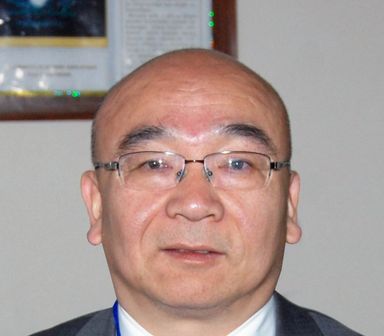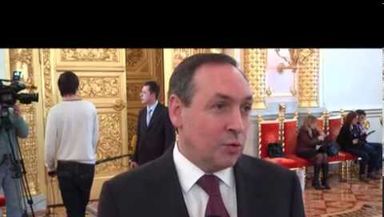
The Trans-Eurasian zone of development (TEBD) can only be implemented as an international mega-project. One of the key partners in this project is China. It is therefore important to find out how it will be developed from the Chinese point of view - how and where will it dock with the "Great Silk Road"? Is there a mutual understanding between Russian and Chinese experts on what the 'development zone' should be like? Professor Li Xin, one of the authors of the co-operation model for the joint implementation of the "Silk Road" and TEBD projects answers Nicholai Vardul’s questions.
Q: Is the Russian project theoretically to be incorporated into "the Silk Road” plan? Or are they competitors?
Competition between the "Great Silk Road "and development of the Trans-Eurasian zone no longer exists
A: "As the chairman of China, Xin Jinping, announced in Astana, "The Great Silk Road" will go through Central Asia to Europe. If the TEBD is aimed only at the modernization of the Trans-Siberian railway, then I think we could talk about certain areas of competition, since a significant part of China's container traffic already goes to the West via Kazakhstan and Belarus. On the Trans-Siberian Railway, freight logistics are not really developed. But at the conference in Shanghai last June where Vladimir Yakunin of RZhD and myself were speakers, an agreement was achieved whereby cargo shipments from Northeast China through to Manchuria can be sent via the Trans-Siberian Railway. Cargo shipments from Western China will follow the main existing route through Kazakhstan and Belarus. So from our point of view competition has effectively already been eliminated. In February 2014 Putin and Jinping agreed in principle on Russia's official participation in the development of the "Great Silk Road" economic zone. This invitation was accepted by Mr Putin; the President agreeing that this convergence should be precisely synchronized with the Trans-Siberian Railway."
"In December last year, I wrote a detailed letter to Yakunin about our vision for the development zone within the "Great Silk Road" plan. As I understand, Yakunin was concerned that the "Silk road" was bypassing Russia. If it was, it would indeed be a blow to the Trans-Siberian route. but the purpose of my letter was precisely to explain that, for us, the Trans-Siberian Railway is a participant in the "Great Silk Road" project with the added possibility of developing the Northeast of China. In addition, I penned a note to our own leaders, which found its way to the CPC Central Committee, there is even a resolution by Xin Jinping on it. I wrote that the Chinese strategic directive for the revival of the North-Eastern territories can equally be considered part of the "Silk Road", but that this revival is impossible without acess to the Trans-Siberian Railway. And more than that, the regeneration of Northeast
China dovetails with the task of the broader Russian project to develop their Far East and create the Trans-Eurasian zone of development or TEBD. Therefore, it is possible to conjoin these projects. Most recently, during a meeting in Dushanbe, Xi Jinping told Putin that China and Russia have always helped each other to respond to external challenges and It is in this context, Xi Jinping spoke of the coordination and the combining of the Russian-Chinese projects - effectively joining the Trans-Siberian Railroad with the "Great Silk Road". Hence transport policies are being agreed at the highest political level between our two countries."
The Trans-Eurasian zone (Belt) of development is not only about the modernization of the Trans-Siberian Railroad
Q: "Is it worth integrating the TEBD project with the gas pipeline "Power of Siberia", which will go from Russia to China?"
A: "I believe that the Trans-Eurasian zone of development is being created not just for the modernization of the Trans-Siberian Railway. This is actually a Belt of Development for this huge geographical territory based on the most modern infrastructure, creating new industrial centres, new employment prospects, even new cities."
Q: "You probably know that the Russian side has some concerns about cooperation with China in the Far East in terms of losing physical territory to China. Would you please comment on these concerns?"
A: "Last June, I was at the Forum in Sochi (15-20?), where I was asked exactly the same question. The concern was about leasing land to China, in his case certain territories for, say, 30 years, and then losing Russian sovereignty over them. The question was: what will happen then, because in fact, it will become Chinese land? I said; not at all. There is international law. For example Hong Kong was in a 100-year lease to the Great Britain, but now Chinese sovereignty over it has been restored."
Q" "Let's go back to your CPC note, on which the Chinese President imposed his resolution. As far as I understand, you wrote exclusively about transport and about convergence with the Trans-Siberian Railway, and not about the possibility of cooperation in the framework of the Trans-Eurasian zone of development. Do I understand it correctly?"
A" :I wrote that the "Great Silk Road" and the development of the Trans-Eurasian zone, are not merely transport projects. First, of course there will be elements of transport infrastructure, including railways, roads, air traffic, plus oil and gas pipelines, electricity, communications etc. Secondly, though, we need economic content, starting from trade, to industry, technology and finance. Thirdly, the human dimension: from education, and social infrastructure building to the development of migration, including internationally."
There are different forms of cooperation; it is possible to find a way that would be optimal for all parties involved
Q: "How will the "Silk Road” project be financed?"
A: "At the moment, the Asia Infrastructure Investment Bank is being created. It's charter capital is 50 billion dollars, potentially to be expanded to 100 billion. Of course, for such a global project as the "Great Silk Road" this is not enough. But the bank will issue bonds and place them on the international financial markets, under state guarantees, of course. Russia intends to join the bank once established."
Q: "It does seem that the "Silk Road" project has also been thoroughly thought through from the financial side. In your opinion, could the Asia Infrastructure Investment Bank also take part in the financing of the Trans-Eurasian Belt of development?"
A: "In principle, of course, it could be involved in this project. China and Russia have created a joint investment fund which could equally be used. I think there are different options for cooperation, and it is possible to find a way that would be optimal for all parties involved."
Q: "If future cooperation on infrastructure projects has been already agreed at the highest level, has a launch date yet been mentioned at all?"
A: "A very complex issue; as far as II know, TEBD exists only at a conceptual level. I think that Vladimir Yakunin does not yet have a concrete project. The "Silk Road" does not exist as a real entity yet either. There is just movement in a general direction."
Q: "Any predictions?"
A: "I think that very soon China will, at least present the broader concept of the "Great Silk Road".
Q: "Will the concept be on a purely ideological level? Or with specifics, maps, plans, figures, estimated costs?"
A: "The concept should be complete, with numbers included. It is already clear that the there will be several routes for the "Silk Road". The main one will lead from the centre of China, through the west of China to Kazakhstan and onwards thereafter. There is then the sea route, and there is the development of Northeast China, from where eventually cargo will be shipped to Europe via the Trans-Siberian Railway."
The Yuan will become a fully convertible currency by 2020.
Q: "Don't you think direct financing in rubles and yuans can help to develop closer cooperation in these mutual projects?"
A: "Since last year, in both Moscow and Shanghai, the ruble and yuan can be freely exchanged directly, rather than through the dollar quotations, though just for one hour per day. There are examples of using our national currencies for foreign trade; the incidence is hardly significant ,although promising, of course."
Q: "You need the PBOC to step in for the free exchange of yuan. Do you agree?"
A: "In principle, yes. I think the yuan will become a freely convertible currency in 2020, since there is a plan to transform Shanghai into an international financial center, precisely in 2020."
Q: "I want to summarize. Vladimir Yakunin has appeared in China twice - in Shanghai and Lanzhou. The mere act of holding these conferences indicates that there is a kind of synchronization of the TEBD project and the "Great Silk Road.", but there seems a danger they might be ready at different times. Does it mean that they could ultimately become competitors?"
A: "That depends on how you look at it. The Trans-Siberian Railway has already begun modernization. So, joining routes with it will be quite possible. "The Power of Siberia" is already under construction. The President of Mongolia is ready to build a transit gas pipeline from Russia to China. There is an agreement on the establishment of a Russian-Chinese-Mongolian economic corridor. You see, we have several joint projects."
Q: "Shall we go back to the Trans-Eurasian project and, more precisely, to its management. If we assume that some sections of the route will be shared with China, then maybe there is enough reason to set up joint companies for its management. Is such a possibility being considered by the Chinese side?"
A: " I am for the coordination of the TEBD project with the "Great Silk Road". What do we need? The most important thing is to get to the stage of project reality. Then we can discuss everything - from the management to finance."
The "Great Silk Road" takes a step towards a greater openness of the Chinese economy to foreign trade liberalization.
A: “The Silk Road" is an open project and we believe that it is a decisive step towards the opening of the Chinese economy and foreign trade liberalization. We are ready to invite all countries that show an interest in participation."
Q: "You talk about opening up, but, as far as I understand, you are against establishing a Russian-Chinese Institute for the promotion of both these projects?"
A: " I'm not against it. It's just not the right time for this institution to work effectively. That said, we have a bright future ahead. Let's make it even brighter together".





